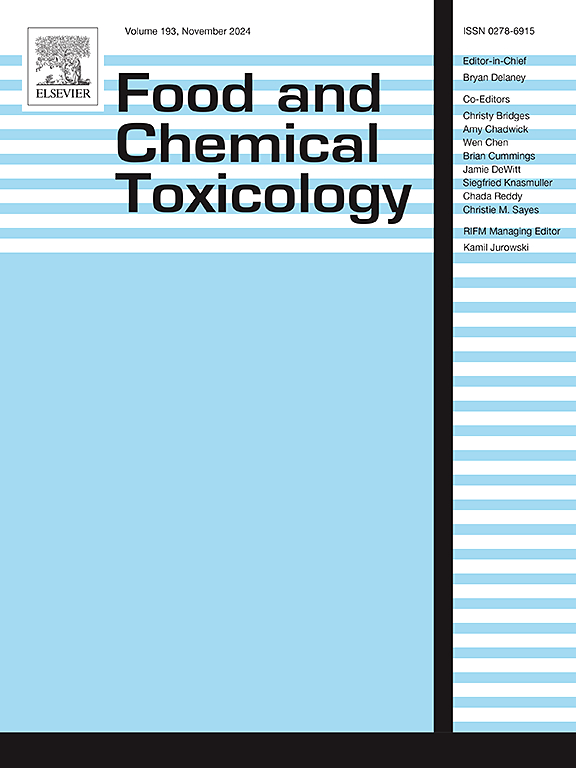含cry1Ab/cry2Aj和EPSPS基因的转基因玉米对两代食蟹猕猴肠道微生物群和代谢物谱长期影响的7年饲料研究
IF 3.9
3区 医学
Q2 FOOD SCIENCE & TECHNOLOGY
引用次数: 0
摘要
与非转基因作物相比,转基因作物对健康的影响仍然存在争议,特别是在长期饮食接触方面。虽然肠道微生物群是一个关键的健康指标,但调查转基因作物消费对肠道微生物群影响的研究仍然有限。本研究通过宏基因组学和代谢组学分析,对表达cry1Ab/cry2Aj和G10evo-EPSPS蛋白的转基因玉米进行了7年的综合评价。与非转基因玉米相比,我们评估了食用转基因玉米对食蟹猴肠道微生物群多样性和代谢物谱的影响。试验采用3种饲粮方案:常规配合饲料(CK组)、含70%非转基因玉米的饲粮配方(玉米组)和含70%转基因玉米的饲粮配方(Tg组)。结果表明,根据物种组成和多样性分析,饲喂转基因玉米的第一代(F0)和第二代(F1)猴子对肠道微生物组的组成、群落结构或功能没有实质性影响。观察到肠道代谢物的微小差异,但与转基因玉米的消费没有直接联系。总的来说,长期摄入含有cry1Ab/cry2Aj和g10evo-epsps基因的玉米对猕猴及其后代没有不良影响。本文章由计算机程序翻译,如有差异,请以英文原文为准。

A 7-year feed study on the long-term effects of genetically modified maize containing cry1Ab/cry2Aj and EPSPS genes on gut microbiota and metabolite profiles across two generations of cynomolgus macaques
The health implications of genetically modified (GM) crops remain controversial relative to their non-GM counterparts, particularly regarding long-term dietary exposure. Although the gut microbiome is a key health indicator, studies investigating the impact of GM crop consumption on intestinal microbiota remain limited. This study presents a comprehensive 7-year evaluation of GM maize expressing cry1Ab/cry2Aj and G10evo-EPSPS proteins through metagenomic and metabolomic analyses. We assessed the effects of GM maize consumption on gut microbiota diversity and metabolite profiles in cynomolgus macaques (Macaca fascicularis) compared with non-GM maize. Three diet regimens were implemented: a conventional compound feed (CK group), diet formulation containing 70 % non-GM maize (Corn group), and diet formulation containing 70 % GM maize (Tg group). The results demonstrated that feeding GM maize to the first (F0) and second (F1) generations of monkeys did not substantially affect the composition, community structure, or function of the intestinal microbiome, as indicated by species composition and diversity analyses. Minor differences in intestinal metabolites were observed but were not directly linked to transgenic maize consumption. Collectively, long-term intake of maize with cry1Ab/cry2Aj and g10evo-epsps genes had no adverse effects on macaques or their offspring.
求助全文
通过发布文献求助,成功后即可免费获取论文全文。
去求助
来源期刊

Food and Chemical Toxicology
工程技术-毒理学
CiteScore
10.90
自引率
4.70%
发文量
651
审稿时长
31 days
期刊介绍:
Food and Chemical Toxicology (FCT), an internationally renowned journal, that publishes original research articles and reviews on toxic effects, in animals and humans, of natural or synthetic chemicals occurring in the human environment with particular emphasis on food, drugs, and chemicals, including agricultural and industrial safety, and consumer product safety. Areas such as safety evaluation of novel foods and ingredients, biotechnologically-derived products, and nanomaterials are included in the scope of the journal. FCT also encourages submission of papers on inter-relationships between nutrition and toxicology and on in vitro techniques, particularly those fostering the 3 Rs.
The principal aim of the journal is to publish high impact, scholarly work and to serve as a multidisciplinary forum for research in toxicology. Papers submitted will be judged on the basis of scientific originality and contribution to the field, quality and subject matter. Studies should address at least one of the following:
-Adverse physiological/biochemical, or pathological changes induced by specific defined substances
-New techniques for assessing potential toxicity, including molecular biology
-Mechanisms underlying toxic phenomena
-Toxicological examinations of specific chemicals or consumer products, both those showing adverse effects and those demonstrating safety, that meet current standards of scientific acceptability.
Authors must clearly and briefly identify what novel toxic effect (s) or toxic mechanism (s) of the chemical are being reported and what their significance is in the abstract. Furthermore, sufficient doses should be included in order to provide information on NOAEL/LOAEL values.
 求助内容:
求助内容: 应助结果提醒方式:
应助结果提醒方式:


